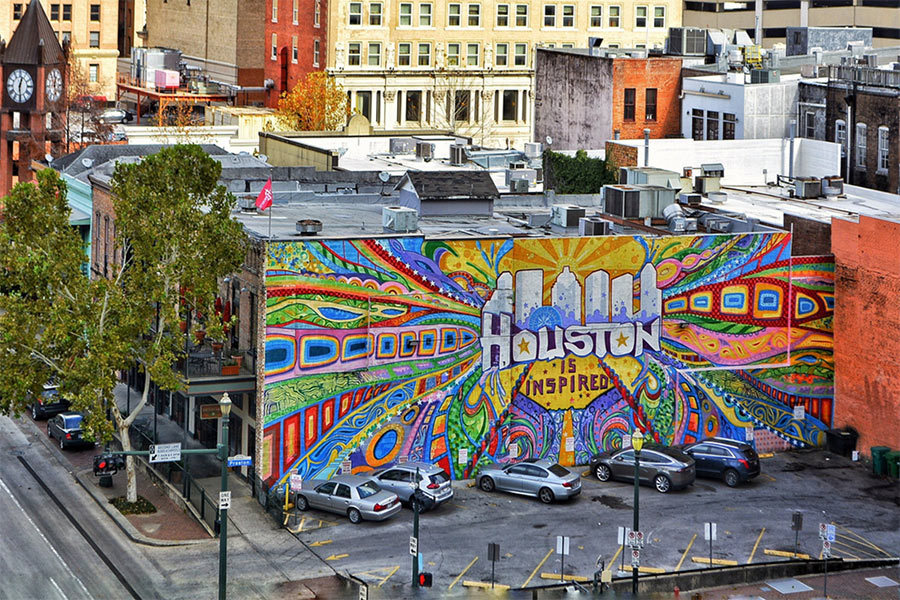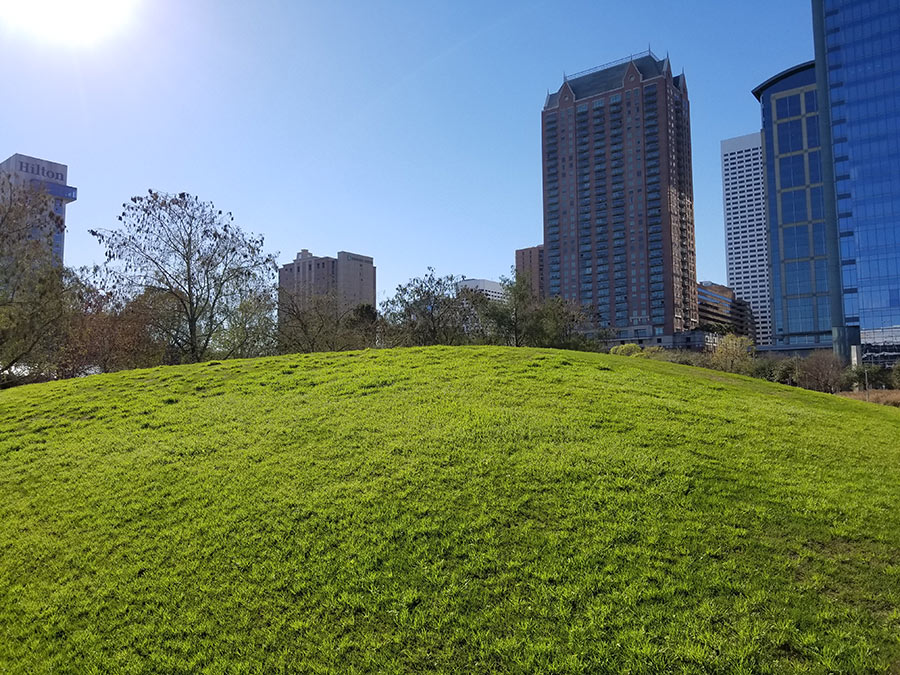
- Houston Has a 38% Chance of Having Lower Home Values in 2 Years, According to Arch Mortgage Insurance Co. [HBJ]
- Fiesta Mart Sold to D.C.-Based Private Equity Investment Firm Acon [Prime Property]
- ClubCorp Completes First Phase of $8M Renovation of The Woodlands Country Club [Prime Property]
- Texas City Restaurant The Reef Seafood House Listed on LoopNet for $975KÂ [Galveston County Daily News ($)]
- First Phase of Tomball Tollway Averaging 33,000 Transactions a Day 2 Weeks After Opening [The Highwayman]
- City Council Approves $5.6M Contract To Fix 600 Potholes Around Houston [Click2Houston]
- Uber Files Suit Against City of Houston To Block Release of Public Records That Would Reveal How It Operates in Texas [Huffington Post]
- CultureMap To Take Over Stands Formerly Occupied By Hudson News, Others at Hobby, IAHÂ [HBJ]
- Some Advice on How To Turn the Pierce Elevated into a Pierce Skypark from People with Actual Experience in That Sort of Thing [Houston Chronicle; previously on Swamplot]
- Exactly Zero Fans Attend Bizarre Orioles–White Sox Game at Camden Yards in Baltimore [LA Times]
Photo of Buffalo Bayou: Swamplot inbox
Headlines





It costs $9,333 to fix a damn pothole??
RE: Pierce Skypark.
I read “Houston could retain a trace of its history. Part of the problem with cities is that things get demolished with no trace left,” and about threw my computer out the window.
NEIGHBORHOODS are a city’s history, not its freeways. Tear the Pierce down.
It costs ten thousand dollars to fix a pothole? As Cheap Pete would say “Good Lord dat’s a lot of money fo’ a pothole!”
I love the analysis in Arch Mortgage Insurance report: every single metric in our analysis is positive for Houston, but prices have a 38% chance of going down within 2 years because OIL!
Re: Potholes. I wonder how much it cost the City to identify and prioritize the 600 individual potholes that are being considered for repair.
Re: Skypark. The Pierce Elevated ROW is a precious resource. These corridors are not easy to put together and whatever happens to it, the ROW should be preserved rather than sold off.
With no zoning or building guidelines; I envision more nondescript apartment buildings with no ground floor retail and about 5 mattress stores being built where the Pierce currently stands. Unless a master plan for that space is created and adhered to by people/companies that purchase the land, there is a high probability that a hodgepodge of development will result. Keep the Pierce and create a 37 acre park wrapping the southern end of downtown.
Pierce Elevated Sky Park? The bums are a-movin on up!
here’s hoping that Fiesta doesn’t go as Randalls has gone.
.
Here’s also hoping that if the state does decide to make tons of traffic for years to get rid of the pierce elevated that it isn’t memorialized as a park that will still separate midtown from downtown.
Tear the pierce down and build the park at ground level. The pierce is too wide and cuts neighborhoods / districts in half. I’ve been on the Highline multiple times and it’s much narrower and less obstructive.
One of the most important parts is around Sam Houston / Heritage park. Tearing the pierce down will bring the park back to its former glory and connect to the Buffalo Bayou Park.
38% chance of lower home values? Wonder how will all the loonies that overpaid feel?
Unless Midtown would rather get absorbed by Downtown, then turning the Pierce into a skypark is a better idea than tearing it down. That way, the park can spur development for both neighborhoods and keep them separate at the same time to retain their own flavor.
The price drops are already happening, but are very area specific. Last week I was able to negotiate a deal for a client who bought a brand new construction in NW Houston from an ask of $750k down to $545k. While a another sold a house in Tanglewood with 2 offers at asking price and one over asking.
So the city with the highest “risk” of lower home prices is Dallas at 42%. That means in the least favorable city in the nation, there’s a 58% chance that home prices will rise. 40 out of the 50 MSA’s in the survey have a risk lower than 15% of declining home prices.
Blah. People overestimate the effect this oil drop will have on Houston. It’s not unreasonable of course, Houston has a very specific history to point back to to frighten us. But there were other things going on there, such as double digit interest rates. I mean, ok, chances are interest rates will be going up as well, but not to Reagan era rates. The fact is that demand for oil hasn’t changed, and it doesn’t matter for a lot of Houston if that oil is cheap or expensive, we’re still going to refine the hell out of it and make the derivatives. Sure, upstream will take a hit, but…well for one screw upstream those guys act like rockstars most of the time (pun intended), but also I think the reality is that a lot of companies knew what was going to happen before it happened and were prepared for this. The smarter companies at least. This oil hit is just weeding out the dum dums.
.
We also have a MUCH more diversified economy than we used to. Most of my friends are high tech/high skilled workers, and of them I am the only one that works in O/G (technically polymers, but whatevs)
.
Look, here’s what really matters. Employment numbers. If people are working then they are paying their mortgages. March numbers are in and they are down from Feb to 4.2%. Compare that to Chicago of 7.1, LA of 8.3, and a national average of 5.5%. This is a STRONG economy.
.
Sure, we’ve definitely been overbuilding. And we’re going to see a correction there. Check out the commodity prices for Lumber, it’s a decent forward indicator of the housing/construction market (Case Schiller is garbage…seriously you don’t include HOUSTON?!?!). Been dropping steadily since January.
.
My guess though is that this is going to be a correction though, not a crash. A crash indicates no sustainable floor. And you’re going to see it in the 500k Urban Living townhouses or in the overbuilt rental market, or in the ridiculous markets like the Heights were a 3/2 can fetch close to 1 million. But quality single family homes in the 150-300 range? I think those aren’t really going anywhere anytime soon. Too many people working. Too many people moving here. Too many people who can buy those.
.
Now, you want some doom and gloom? You want to be afraid? Consider this. The average retiree has very little cash money in savings, most of it is in their house. Eventually they will need to leverage that to pay for ballooning medical expenses. Which means they will either sell or start a reverse mortgage. I read somewhere that reverse mortgage rates are already increasing dramatically. If someone knows where to find application rates I would love to know that. But if the boomers start selling their houses in droves we’re in trouble.
.
However, where do the boomers live, where would they be selling? Suburbs. Where do young people entering the market not want to buy. Suburbs. That’s the third market I see having serious problems in the future. As young middle/upper middle class people build up the housing costs in the inner city, like they are currently doing in the east end and northside and will start doing in the third ward over the next decade, where are the people pushed out going to go? The Suburbs. Or the fifth ward…
.
And that there is a huge wall of speculation that has just about as much value as most of the other massive speculation articles that are usually self serving in some way not immediately clear (in my case I am promoting the East End.)
@ MrEction: I agree with you in broad strokes, but its foolish to disregard commodity prices for production volumes. If the current energy prices and/or a weak dollar are sustained for another couple of years or if the global economy turns sour then Houston has a serious problem to contend with. Recessions happen periodically — they just do — and its very easy to conceive of several ways right now that a big one could unfold that would drive energy prices and economic activity in general much lower. Furthermore, longer-term global energy demand is likely to slow due to demographic change in Europe and east and northeast Asia and due to creeping technological change that most likely favors the electron to the hydrocarbon molecule.
A technical criticism is to be wary about stating employment numbers in year-over-year percent changes. These usually understate the magnitude of increase or decrease in recent periods. We need to cite seasonally-adjusted numbers in absolute terms to get a picture of what’s happening in the very short term (which is what we’re after).
Finally, please allow me to offer a cautionary statement about the East End and Third Ward submarkets. When other parts of Houston’s urban core are overbuilt, that’s when the lower-cost alternatives get hurt the most. They are by their very nature more volatile because by and large that is where people go that have been priced out of areas that are perceived of as being nicer. Longer-term, yes it is very easy to imagine that these neighborhoods should prosper, but the next couple of years might still be rough.
@TheNiche Don’t get me wrong, these oil prices are going to be felt in the economy. But I think the first hits are all going to be upstream. Some of that can be seen with the layoffs at services companies that have already come, but the main hits are going to be in places like North Dakota or the West Texas fields. Those roughnecks are in for a very rough couple of years.
.
But the oil business as a whole? Like I said, oil needs to be refined still. Plastic still needs to be made. Exxon is still moving thousands of employees here. And just check out Exxon’s stock. They just released earnings numbers and, while it was low, it still beat expectations. Same with Chevron. A lot of these companies are a lot more robust than they used to be. The mom and pops of the industry, the guys will a couple of wells producing a few thousand barrels a month, they are in a LOT of trouble, and the guys working on low quality wells, they are in for a hurting, but the big boys should be able to ride out a few bad years.
.
And if it goes past a few years? Man. We’re ALL in trouble. But the commodity prices of oil have actually been doing a slow but strong climb up since their lows in January. WTI is already back at 60, and Brent even higher. All told I think they’ve regained about 30% of their loss already.
.
Truth is there is just so much uncertainty in the oil market right now that it’s really hard to predict anything. Russia is a complete unkown at this point. That’s got its good and bad sides for us. The good is that if they keep screwing up then eventually their supply will be pulled from the western european market which would be amazing for oil prices. That may already be worked into the market values, which could be bad if they get back some semblance of being a good global citizen. The bad is that a lot of companies have significant capex projects over there that could go the way of venezuala. Then you have the Saudis. The Saudi succession doesn’t seem to have made much of a difference yet, but with the change in the crown prince they may be up for some internal issues soon.
.
Lots of uncertainties.
.
Also, what are you talking about with a weak dollar? The dollar is a freaking rockstar right now, at least relatively (which is the only way to look at it). USD to CAD is up like 20% in the last year. USD to EUR is up wayyyy more. AUS is in the crapper as well. Same with the pound. The Yen. Actually I’m looking around and I can’t find a single currency that we haven’t been smoking in the last year.
But I mean hey, like I said before, every narrative has its context. I’m bullish because I’ve recently purchased. In my course of purchasing whenever I would lose out on a house I would immediately switch the narrative and say “oh yeah well the market is in for a negative swing”. And maybe the whole thing is just a fairy tale I tell myself to feel more comfortable about my investment.
.
But at the end of the day I’m ultimately comfortable with it, even if it does go bust, because myself and my wife have in demand skills, even in a bad market, and we can work in any economy, more than likely. And that’s sort of how I see Houston. At the end of the day, Houston is strong because this is a town where we make something. Not just generating credit-default-swaps or tourism or artists or “knowledge workers” or tech toys or whatever, we actually MAKE real stuff that has real value.
.
Now, I realize I just described Detroit 30 years ago. I get that. But this is my fairy tail. Damnit.
@ MrEction: Yes, I agree with most of what you’ve said. The first hits are being felt in upstream, although midstream is following rapidly suit. The hardest-hit are on smaller operators and smallholders, and so rural areas and small cities are especially exposed. OTOH, prices and profitability at the wellhead vary a great deal on the grade of crude and a lot of other factors. And some companies are well-hedged.
But there’s also a very STRONG dollar (yeah sorry, I typed in the opposite of what my brain was thinking for some reason) and that’ll squeeze domestic downstream operations and anything that can be exported or substituted with imports. I’m less confident in the sustainability of a strong dollar over time, though, than I am about energy prices staying low. And this sector is often buoyed by international activity that feeds into Houston. In general, any large multinational corporation is going to be better-positioned to ride this stuff out (and perhaps even to prosper) than are smaller firms. But that doesn’t mean that small firms are unimportant or that the large firms won’t be affected.
But to talk about beating earnings expectations…. Whose expectations about what? Analysts are concerned about earnings, but earnings don’t necessarily line up very well with Houston macroeconomic performance. I don’t believe that to necessarily be useful information.
Another thing we agree on — lots of uncertainties. But I don’t necessarily see a lot of upside uncertainties. Exxon has been saying for years that $60 or $65 oil is where they would like it to be. Above that price and they have short-term profitability but they also see demand destruction and supply substitution. The Saudis are doing what they’re doing for the very same reason. They want to extend the age of oil. Its great policy for their part, very wise, but that means that realizing any of the upside risks that could put Houston back into boomtown mode can also be its undoing over a somewhat longer period of time.
The Tomball tollway has more daily riders in two weeks than MetroRail could attract in over a decade. Classic.
You guys should just get a room.